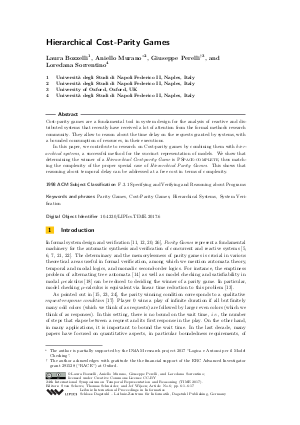Hierarchical Cost-Parity Games
Authors Laura Bozzelli, Aniello Murano, Giuseppe Perelli, Loredana Sorrentino
-
Part of:
Volume:
24th International Symposium on Temporal Representation and Reasoning (TIME 2017)
Part of: Series: Leibniz International Proceedings in Informatics (LIPIcs)
Part of: Conference: International Symposium on Temporal Representation and Reasoning (TIME) - License:
 Creative Commons Attribution 3.0 Unported license
Creative Commons Attribution 3.0 Unported license
- Publication Date: 2017-09-25
File

PDF
LIPIcs.TIME.2017.6.pdf
- Filesize: 0.63 MB
- 17 pages
Document Identifiers
Subject Classification
Keywords
- Parity Games
- Cost-Parity Games
- Hierarchical Systems
- System Verification
Metrics
- Access Statistics
-
Total Accesses (updated on a weekly basis)
0Document
0Metadata
Abstract
Cost-parity games are a fundamental tool in system design for the analysis of reactive and distributed systems that recently have received a lot of attention from the formal methods research community. They allow to reason about the time delay on the requests granted by systems, with a bounded consumption of resources, in their executions. In this paper, we contribute to research on Cost-parity games by combining them with hierarchical systems, a successful method for the succinct representation of models. We show that determining the winner of a Hierarchical Cost-parity Game is PSpace-Complete, thus matching the complexity of the proper special case of Hierarchical Parity Games. This shows that reasoning about temporal delay can be addressed at a free cost in terms of complexity.
Cite As Get BibTex
Laura Bozzelli, Aniello Murano, Giuseppe Perelli, and Loredana Sorrentino. Hierarchical Cost-Parity Games. In 24th International Symposium on Temporal Representation and Reasoning (TIME 2017). Leibniz International Proceedings in Informatics (LIPIcs), Volume 90, pp. 6:1-6:17, Schloss Dagstuhl – Leibniz-Zentrum für Informatik (2017)
https://doi.org/10.4230/LIPIcs.TIME.2017.6
BibTex
@InProceedings{bozzelli_et_al:LIPIcs.TIME.2017.6,
author = {Bozzelli, Laura and Murano, Aniello and Perelli, Giuseppe and Sorrentino, Loredana},
title = {{Hierarchical Cost-Parity Games}},
booktitle = {24th International Symposium on Temporal Representation and Reasoning (TIME 2017)},
pages = {6:1--6:17},
series = {Leibniz International Proceedings in Informatics (LIPIcs)},
ISBN = {978-3-95977-052-1},
ISSN = {1868-8969},
year = {2017},
volume = {90},
editor = {Schewe, Sven and Schneider, Thomas and Wijsen, Jef},
publisher = {Schloss Dagstuhl -- Leibniz-Zentrum f{\"u}r Informatik},
address = {Dagstuhl, Germany},
URL = {https://drops.dagstuhl.de/entities/document/10.4230/LIPIcs.TIME.2017.6},
URN = {urn:nbn:de:0030-drops-79175},
doi = {10.4230/LIPIcs.TIME.2017.6},
annote = {Keywords: Parity Games, Cost-Parity Games, Hierarchical Systems, System Verification}
}
Author Details
References
-
S. Almagor, Y. Hirshfeld, and O. Kupferman. Promptness in omega-Regular Automata. In ATVA'10, LNCS 7388, pages 22-36, 2010.

-
R. Alur, M. Benedikt, K. Etessami, P. Godefroid, T. W. Reps, and M. Yannakakis. Analysis of recursive state machines. TOPLAS, 27(4):786-818, 2005.

-
R. Alur, S. Kannan, and M. Yannakakis. Communicating hierarchical state machines. In Automata, Languages and Programming, 26th International Colloquium, ICALP'99, Prague, Czech Republic, July 11-15, 1999, Proceedings, pages 169-178, 1999.

-
R. Alur and M. Yannakakis. Model checking of hierarchical state machines. ACM Trans. Program. Lang. Syst., 23(3):273-303, 2001.

- B. Aminof, O. Kupferman, and A. Murano. Improved Model Checking of Hierarchical Systems. Inf. Comput., 210:68-86, 2012. URL: http://dx.doi.org/10.1016/j.ic.2011.10.008.
-
B. Aminof, F. Mogavero, and A. Murano. Synthesis of Hierarchical Systems. In FACS'11, LNCS 7253, pages 42-60. Springer, 2011.

-
B. Aminof, F. Mogavero, and A. Murano. Synthesis of Hierarchical Systems. SCP, 83:56-79, 2014.

-
K. Chatterjee and L. Doyen. Energy Parity Games. Theor. Comput. Sci., 458:49-60, 2012.

-
K. Chatterjee, T. A. Henzinger, and M. Jurdzinski. Mean-Payoff Parity Games. In LICS'05, pages 178-187, 2005.

-
K. Chatterjee, T. A. Henzinger, and F. Horn. Finitary winning in ω-regular games. ACM Trans. Comput. Logic, 11(1), 2009.

-
E. M. Clarke and E. A. Emerson. Design and Synthesis of Synchronization Skeletons Using Branching-Time Temporal Logic. In LP'81, LNCS 131, pages 52-71. Springer, 1981.

-
E. M. Clarke, O. Grumberg, and D. A. Peled. Model Checking. MIT Press, 2002.

-
E. A. Emerson and C. Jutla. Tree Automata, μ-Calculus and Determinacy. In FOCS, pages 368-377, 1991.

-
E. A. Emerson and C. S. Jutla. The Complexity of Tree Automata and Logics of Programs. SJM, 29(1):132-158, 1999.

-
N. Fijalkow and M. Zimmermann. Parity and Streett Games with Costs. Logical Methods in Computer Science, 10(2), 2014.

-
S. Göller and M. Lohrey. Fixpoint logics on hierarchical structures. In FSTTCS'05, LNCS 3821, pages 483-494. Springer, 2005.

-
M. Jurdzinski, M. Paterson, and U. Zwick. A Deterministic Subexponential Algorithm for Solving Parity Games. SIAM J. Comput., 38(4):1519-1532, 2008.

-
D. Kozen. Results on the Propositional muCalculus. TCS, 27(3):333-354, 1983.

-
O. Kupferman, N. Piterman, and M. Y. Vardi. From Liveness to Promptness. Formal Methods in System Design, 34(2):83-103, 2009.

-
O. Kupferman, M. Y. Vardi, and P. Wolper. An Automata Theoretic Approach to Branching-Time Model Checking. JACM, 47(2):312-360, 2000.

-
O. Kupferman, M. Y. Vardi, and P. Wolper. Module Checking. IC, 164(2):322-344, 2001.

-
V. Malvone, A. Murano, and L. Sorrentino. Concurrent Multi-Player Parity Games. In AAMAS'16, pages 689-697, 2016.

-
F. Mogavero, A. Murano, and L. Sorrentino. On Promptness in Parity Games. In LPAR'13, LNCS 8312, pages 601-618. Springer, 2013.

- F. Mogavero, A. Murano, and L. Sorrentino. On Promptness in Parity Games. Fundam. Inform., 139(3):277-305, 2015. URL: http://dx.doi.org/10.3233/FI-2015-1235.
-
A. Pnueli. The Temporal Logic of Programs. In FOCS'77, pages 46-57. IEEE Computer Society, 1977.

-
J. P. Queille and J. Sifakis. Specification and Verification of Concurrent Programs in Cesar. In SP'81, LNCS 137, pages 337-351. Springer, 1981.

